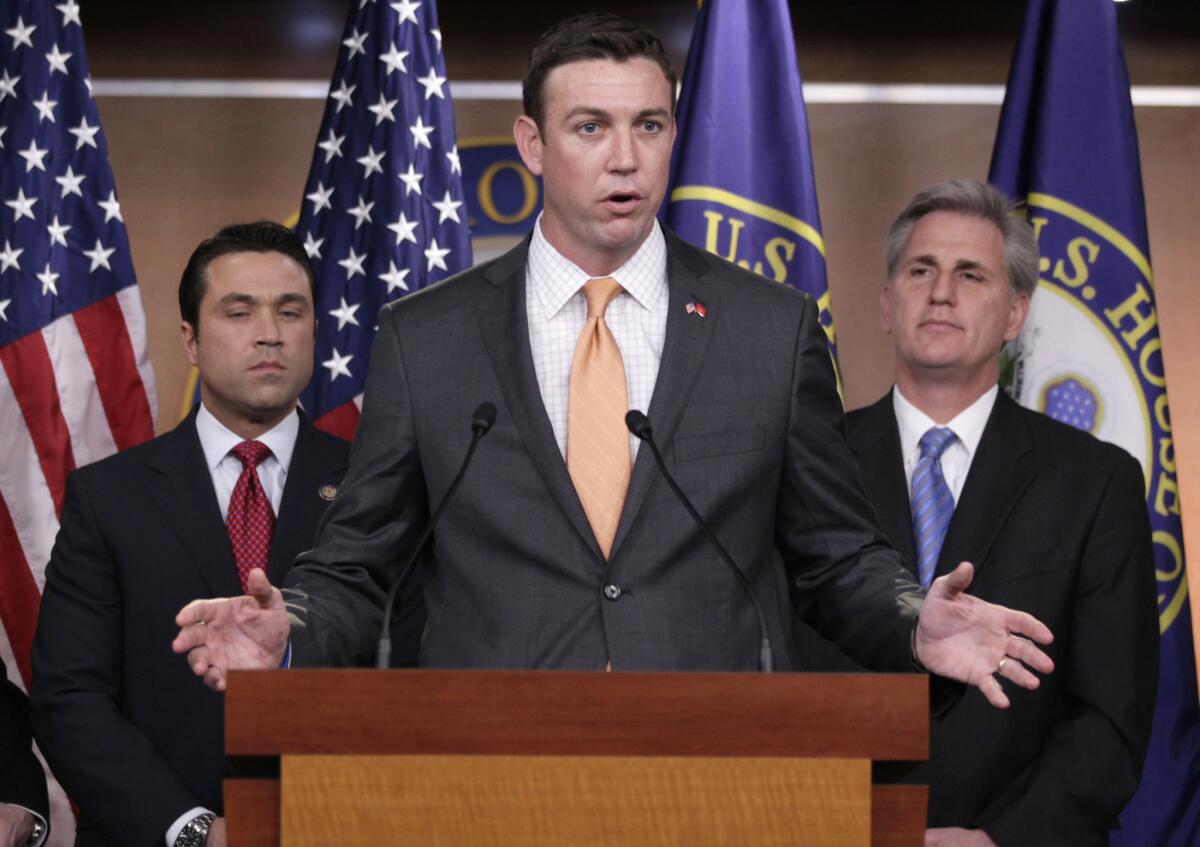California representative reimburses campaign for payments to oral surgeon and kids’ school

Rep. Duncan Hunter, R-Calif., center, speaks during a news conference on Capitol Hill on Thursday, April 7, 2011.
- Share via
Rep. Duncan D. Hunter (R-Alpine) says he has written personal checks totaling almost $12,000 to reimburse his campaign treasury for personal and mistaken expenditures in 2015 and the first quarter of this year.
The reimbursements covered $6,150 of campaign money paid to Hunter’s children’s school, $811 paid to an oral and facial surgeon, and $4,935 in “event support items,” “event donation items” and other expenses that Hunter’s office declined to identify with any more specificity.
“The charges should never have happened, but regardless of who made them and when, Congressman Hunter is taking full responsibility — and that includes responsibility for resolution,” said a statement from Hunter’s congressional spokesman, Joe Kasper.
Separately, Hunter’s office says, the campaign treasury has been made whole for some $1,300 in video game charges that Hunter has described as fraudulent activity on his campaign credit card. The credit card company reversed the charges.
Hunter’s reimbursements came amid a review by the San Diego Union-Tribune of an unusual pattern of expenditures listed on his 2015 disclosure forms as personal expenses or mistaken charges “to be paid back” — although they were not.
The review was prompted by a letter the Federal Election Commission sent last week to Hunter’s campaign, questioning the video game transactions and a single $1,650 payment to Christian Unified Schools in El Cajon, where Hunter’s three children are students.
The $12,000 in payments represent reimbursement of more questionable spending than the FEC or the newspaper had found.
For instance, the FEC questioned only one $1,650 payment to the school. Hunter reimbursed that one and two others, saying they were intended as contributions — which is a legal expense of campaign funds — but were mistakenly applied as tuition.
See more of our top stories on Facebook >>
Hunter’s staff attributed the misapplication of funds to a credit card mix-up, a familiar refrain in the ongoing review of campaign accounts.
In the future, the campaign will make all charitable donations by check so they aren’t misdirected, the statement from Hunter’s office said.
“Honest accidents and mistakes” led to the inappropriate charges on the campaign credit card, Kasper said.
The campaign will work with the FEC to file amended reports or explanatory statements to clarify the public record, Kasper said. The FEC set a May 9 deadline for response to its initial concerns.
Personal expenditures of campaign funds are strictly forbidden under federal election laws, the FEC told Hunter in its letter on April 4, although speedy correction of such errors is taken into consideration before enforcement decisions are made.
About $5,000 in 2015 expenditures the campaign had identified as mistaken or personal expenditures in need of repayment had lingered without reimbursement for months, before Hunter returned from Israel.
Other charges were reimbursed more quickly, such as three charges totaling $5,161 to Aston Kaanapali Shores in Hawaii. Those charges were repaid within the same filing period, records showed.
Kasper said the Hawaiian hotel charges were supposed to cover Hunter’s lodging in April 2015 in connection with a planned campaign event. When the campaign event was canceled, the trip became personal travel. Hunter tried to get the hotel to credit charges back to the campaign’s card and charge his personal card instead. That effort was unsuccessful, so Hunter reimbursed the campaign.
Gary Jacobson, a professor of political science at UC San Diego, said the FEC rarely punishes candidates for relatively minor use of campaign funds for personal purposes, as long as the candidate repays the money.
“The FEC’s record on this is, they don’t do much, and the penalty is typically slight,” Jacobson said Monday.
When news of the inquiry into Hunter’s video game expenditures broke last week, Hunter was in Israel, where he was traveling with the Friends of the Israel Defense Forces, a nonprofit that supports Israel’s soldiers, Kasper said. Hunter returned home early to address the campaign finance questions and repay charges as necessary.
The campaign funded Hunter’s trip to Israel, Kasper said. The campaign checked with the House Committee on Ethics before deciding on a funding source, and the committee said campaign funds could be used because Hunter was invited in connection with his standing as a member of the House Armed Services Committee.
Public scrutiny of Hunter’s campaign expenditures led Citizens for Responsibility and Ethics in Washington, a nonprofit based in Washington, D.C., to take a closer look at his campaign and personal financial disclosure records. In a report the nonprofit plans to release Tuesday, the group identified what appeared to be missing information on the personal financial disclosure forms Hunter had on file with the House clerk.
The group noted that income Hunter’s wife, Margaret, received from Hunter’s campaign for consulting services didn’t appear on disclosure forms for 2011 and 2014.
The campaign paid Margaret Hunter $8,000 in 2011 and $39,000 in 2014, according to the group’s review of campaign finance records — where the payments were disclosed.
On Monday, Hunter’s congressional office sent a letter to the House Committee on Ethics, requesting amendments to several years of financial disclosure reports.
ALSO
The LAPD dropped him off at LAX 2 months ago. He’s still missing
Man sentenced to jail after fatal street racing crash in Wilmington
$28-billion L.A. County budget proposal aims to address homelessness, improve jails
More to Read
Sign up for Essential California
The most important California stories and recommendations in your inbox every morning.
You may occasionally receive promotional content from the Los Angeles Times.









